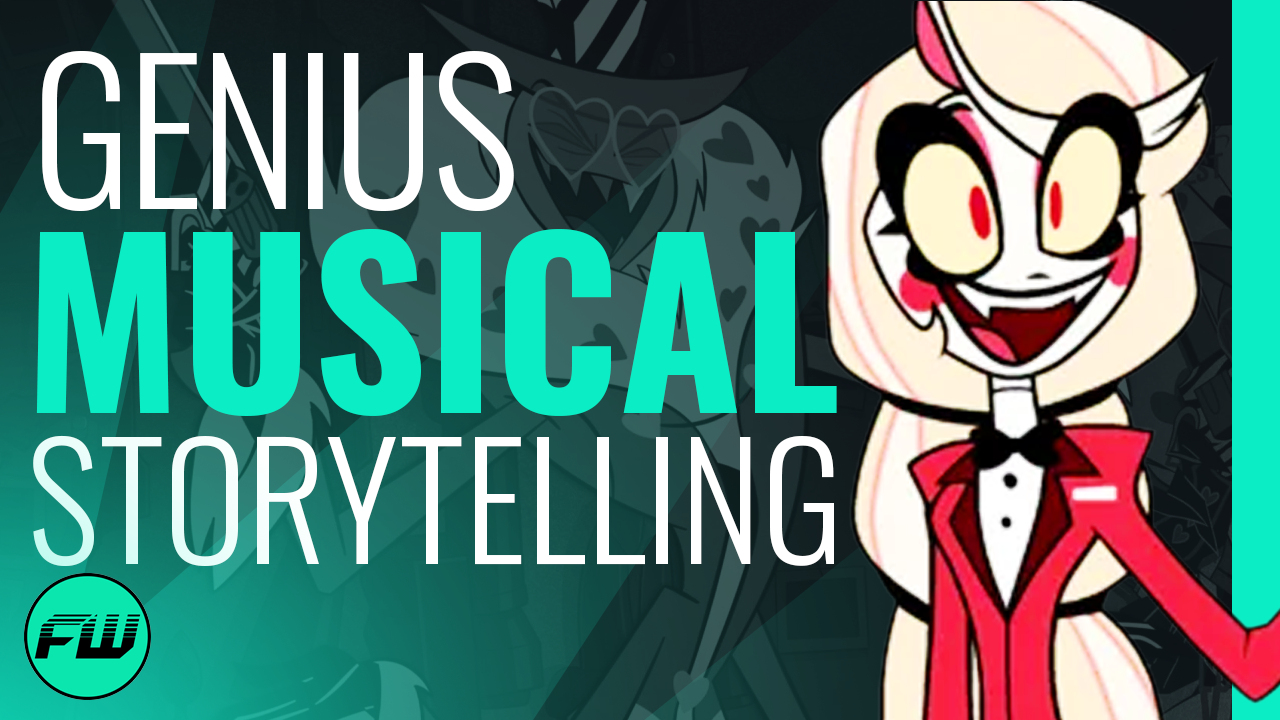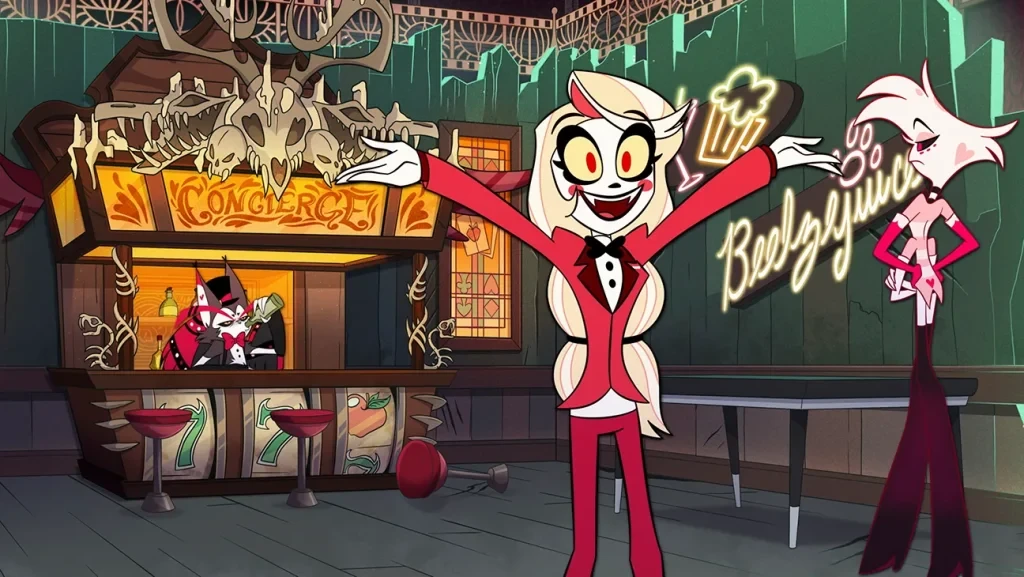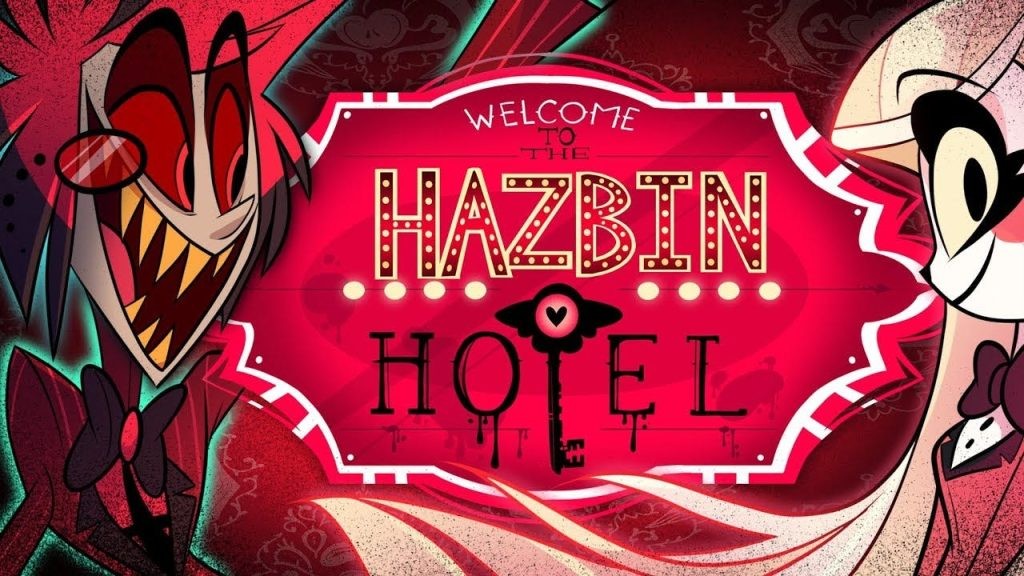In this FandomWire Video Essay, we explore the genius musical storytelling of Hazbin Hotel.
Check out the video below:
Subscribe & hit the Notification Bell so you never miss a video!
Hazbin Hotel’s Musical Storytelling
THIS….. Is musical storytelling at its finest. Spawning from a 2019 viral YouTube pilot, A24, Amazon Prime, and creator Vivienne Medrano’s Hazbin Hotel has quickly proven itself to be a massive success; boasting the largest global debut for an animated series on Prime Video….. EVER and scoring rave reviews from both critics and audiences, with Decider’s Raven Brunner praising the “queer, raunchy, and fun” animated series for its “exciting character arcs” and “thrilling story.”
Indeed, one doesn’t have to look too hard at Hazbin Hotel’s unique animation and art style, shockingly dense plot and lore, and unabashedly vulgar sense of humor to see why it’s amassed such a large audience so quickly. But there is one other element that sets Hazbin apart from its adult animation contemporaries: it’s a musical. Featuring two musical numbers in each of its eight episodes, the show’s first season wears its Broadway influences on its sleeve, to the point of including several Broadway alums, such as Mean Girls: The Musical’s Erika Henningsen and Beetlejuice: The Musical’s Alex Brightman in its main voice cast.
But what makes Hazbin Hotel such a standout in this regard? A great musical isn’t exactly the easiest thing to pull off, so how does the series do it so well so consistently? Well, reserve your rooms and check in as we dive into the genius musical storytelling of Hazbin Hotel. Oh, and in case it wasn’t obvious, there will be MAJOR SPOILERS for Hazbin Hotel Season 1, so watch at your own risk if you haven’t finished watching it yet. You have been warned.
Anyways, one of the oldest adages in musical theater is that songs happen because the emotions of a scene are simply too big for spoken word. When someone can’t speak, they sing. And when they can’t sing, they dance. Hazbin Hotel understands and embraces this philosophy to a tee. Take for instance, “Poison” from Episode 4, a song sung by and centered on the character Angel Dust, focusing on his struggles with addiction and his abusive relationship with his boss Valentino. The song obviously deals with intense and complex subject matter that, to be handled properly in spoken word, would likely require breaking the pace of what’s supposed to be a quick-witted comedy. So instead of just being a monologue, the character information is communicated through the exact type of electronic pop-punk dance beat played at the bars and clubs that Angel Dust frequents; effectively communicating the emotion of the character while staying true to the show’s format.
As for the “when they can’t sing, they dance” part, that can be seen most literally in Episode 7’s “Out For Love,” wherein the sparring match between Carmilla and Vaggie is framed more as a poetic ballet than it is a normal fight. But in a broader philosophical sense, it can best be seen in the show’s more surrealist visuals during musical numbers. The mental combat Alastor has against Vox and Lucifer during Episode 2’s “Stayed Gone” and Episode 5’s “Hell’s Great Dad” respectively feature rapidly shifting backgrounds, tons of blink-and-you’ll-miss-it visual gags, and rather fluid character movement that, while not strictly dancing, largely serves the same function as dancing. Or you could look at how Episode 4’s “Loser, Baby” shifts from a depressing back alley at the beginning of a song to a jazzy, neon-soaked wonderland by the end as Husk and Angel Dust’s self-worth improves over the course of the song.
But the art of a great musical song goes beyond this aforementioned adage. The best musical songs also need to deliver essential information about plot and character that the dialogue often can’t. One of the best examples of this in Hazbin Hotel comes from the show’s first number, Episode 1’s “Happy Day In Hell.” The lyrics of the song tell the audience what Charlie is doing, why she’s doing it, and get her from Point A to Point B efficiently and effectively, the tone of Erika Henningsen’s vocal performance and the Disney-style instrumentals quickly let us know that Charlie is an extremely optimistic person….or demon, technically, and the often horrific visuals of Hell itself both establish Hell as a setting, up to and including establishing important locations for later episodes like Valentino’s studio and Cannibal Town IN A SINGLE SENTENCE, and quickly let the audience know that Charlie is the odd one out here. And much of this same philosophy can be seen in the show’s big showstopper numbers like Episode 7’s “Ready For This” and Episode 8’s “The Show Must Go On.”
But even the smaller songs still manage to communicate a surprisingly large amount of story and character. Sir Pentious’ redemption arc plays a massive role in the finale and it kicks off with a less than two-minute musical number: Episode 2’s “It Starts With Sorry.” Episode 6’s “Welcome To Heaven” is only one minute long and tells us everything we need to know about Heaven as a setting on top of introducing most of our main angel characters. And Episode 3’s “Respectless” is only five seconds longer than “It Starts With Sorry” and still manages to effectively communicate who both Velvette and Carmilla are as characters while also firmly establishing the idea that the once-thought invincible angels can be killed and that Carmilla knows how to do that; key plot points for the rest of the season.
Hazbin Hotel’s music communicates these kinds of plot points more often than you might think, such as how Episode 2’s “Hell Is Forever” ends on the big reveal that Heaven’s annual extermination has been moved up. And Vaggie’s verses in both “Happy Day In Hell” and Episode 3’s “Whatever It Takes” not only tell us about her trust issues and difficulties with being vulnerable in general but her issues with angels specifically, giving the audience an early hint at the eventual reveal of Vaggie’s past as an exorcist angel as seen in Episode 6.
But perhaps the most clever way Hazbin Hotel uses music is in its recurring themes, or leitmotifs if you want to be fancy about it. Some of these are more subtle, like how the instrumentals of “Loser, Baby” can be heard during Husk and Angel Dust’s bar conversation in the finale, while others are more obvious like the return of many chords and lyrics from “Happy Day in Hell” in “The Show Must Go On” or the literal reprise of Episode 5’s “More Than Anything” in the finale. The latter even manages to change the original’s meaning while still keeping the melody exactly the same, going from the platonic familial love between Lucifer and Charlie in the original to the romantic love between Charlie and Vaggie in the reprise.
But the most impressive example of this comes from Episode 6’s “You Didn’t Know.” This song is filled to bursting with intense character moments and shocking plot reveals. Charlie’s optimism reaches its lowest point, the horror and hypocrisy of Adam and the other exorcists’ actions are laid bare for the entirety of Heaven to see, and even Emily, one of Heaven’s newest and most enthusiastic seraphims is left questioning whether or not any of them were ever truly in the right. Like the best musical numbers from the best musicals, it’s a song with intense emotionality that keeps building and building throughout until finally climaxing in THIS. ONE. MOMENT.
Bringing back the main melody of “Hell Is Forever,” adding contrasting harmonies on top of it, and using the new lyrics as a counterargument and rebuttal to that song’s message within an otherwise original piece? That is undeniably excellent musical craftsmanship and there’s still one more verse to go after that. The song actually ends with Adam outing Vaggie as a former exorcist to Charlie, which then goes on to inform both character’s plots in the next episode. And directly informing the actions of the characters and the direction of the story is what ALL great musical songs should do.
There’s a lot to appreciate about Hazbin Hotel. Its subversive take on Biblical mythology is captivating and refreshing, its fast-paced and unashamedly crude sense of humor never fails to get a laugh, and its unique production history as an independently produced and released YouTube pilot to full-blown hit series with a second season and likely more on the way serves as a welcome sign of hope amidst an animation industry plagued by corporate dependence, unfair wages and working conditions, and premature cancellations.
But its music is by far the highlight. Each song effectively communicates story and character, while also just being extremely catchy and fun to sing along to. Songs like “Poison” or “Loser, Baby” discuss deep subject matter and feature eye-catching visuals, while also containing remarkably infectious melodies that probably won’t leave your head anytime soon, not that you would want them to. You’ve probably been humming the soundtrack throughout this whole video, haven’t you? It’s okay to admit it. With its memorable lyrics, intense emotionality, and everything in between, there’s no denying that Hazbin Hotel’s musical storytelling is simply genius.
Now we want to hear from you, our esteemed hotel guests. What did you think of Hazbin Hotel? What’s your favorite song from the show so far? And what are you hoping to see in Season 2 and beyond? Let us know in the comments below, and as always, be sure to subscribe and hit that bell so you can see future videos like this as soon as they go up. Until next time, thanks for watching.
Follow us for more entertainment coverage on Facebook, Twitter, Instagram, and YouTube.



